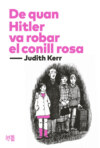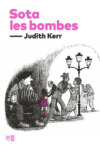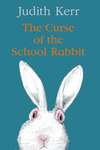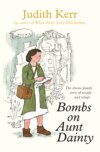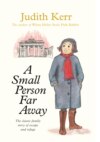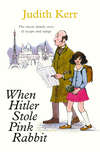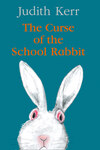Kitabı oku: «Out of the Hitler Time trilogy: When Hitler Stole Pink Rabbit, Bombs on Aunt Dainty, A Small Person Far Away», sayfa 3
Chapter Four 
Suddenly she found herself being gently shaken. She must have been asleep. Mama said, “We’ll be in Stuttgart in a few minutes.”
Anna sleepily put on her coat, and soon she and Max were sitting on the luggage at the entrance of Stuttgart station while Mama went to get a taxi. The rain was still pelting down, drumming on the station roof and falling like a shiny curtain between them and the dark square in front of them. It was cold. At last Mama came back.
“What a place!” she cried. “They’ve got some sort of a strike on – something to do with the elections – and there are no taxis. But you see that blue sign over there?” On the opposite side of the square there was a bluish gleam among the wet. “That’s a hotel,” said Mama. “We’ll just take what we need for the night and make a dash for it.”
With the bulk of the luggage safely deposited they struggled across the ill-lit square. The case Anna was carrying kept banging against her leg and the rain was so heavy that she could hardly see. Once she missed her footing and stepped into a deep puddle so that her feet were soaked. But at last they were in the dry. Mama booked rooms for them and then she and Max had something to eat. Anna was too tired. She went straight to bed and to sleep.
In the morning they got up while it was still dark. “We’ll soon see Papa,” said Anna as they ate their breakfast in the dimly-lit dining room. Nobody else was up yet and the sleepy-eyed waiter seemed to grudge them the stale rolls and coffee which he banged down in front of them. Mama waited until he had gone back into the kitchen. Then she said, “Before we get to Zurich and see Papa we have to cross the frontier between Germany and Switzerland.”
“Do we have to get off the train?” asked Max.
“No,” said Mama. “We just stay in our compartment and then a man will come and look at our passports – just like the ticket inspector. But” – and she looked at both children in turn – “this is very important. When the man comes to look at our passports I want neither of you to say anything. Do you understand? Not a word.”
“Why not?” asked Anna.
“Because otherwise the man will say ‘What a horrible talkative little girl, I think I’ll take away her passport’,” said Max, who was always bad-tempered when he had not had enough sleep.
“Mama!” appealed Anna. “He wouldn’t really – take away our passports, I mean?”
“No …no, I don’t suppose so,” said Mama. “But just in case – Papa’s name is so well known – we don’t want to draw attention to ourselves in any way. So when the man comes – not a word. Remember – not a single, solitary word!”
Anna promised to remember.
The rain had stopped at last and it was quite easy walking back across the square to the station. The sky was just beginning to brighten and now Anna could see that there were election posters everywhere. Two or three people were standing outside a place marked Polling Station, waiting for it to open. She wondered if they were going to vote, and for whom.
The train was almost empty and they had a whole compartment to themselves until a lady with a basket got in at the next station. Anna could hear a sort of shuffling inside the basket – there must be something alive in it. She tried to catch Max’s eye to see if he had heard it too, but he was still feeling cross and was frowning out of the window. Anna began to feel bad-tempered too and to remember that her head ached and that her boots were still wet from last night’s rain.
“When do we get to the frontier?” she asked.
“I don’t know,” said Mama. “Not for a while yet.” Anna noticed that her fingers were squashing the camel’s face again.
“In about an hour, d’you think?” asked Anna.
“You never stop asking questions,” said Max, although it was none of his business. “Why can’t you shut up?”
“Why can’t you?” said Anna. She was bitterly hurt and cast around for something wounding to say. At last she came out with, “I wish I had a sister!”
“I wish I didn’t!” said Max.
“Mama …!” wailed Anna.
“Oh, for goodness’ sake, stop it!” cried Mama. “Haven’t we got enough to worry about?” She was clutching the camel bag and peering into it every so often to see if the passports were still there.
Anna wriggled crossly in her seat. Everybody was horrible. The lady with the basket had produced a large chunk of bread with some ham and was eating it. No one said anything for a long time. Then the train began to slow down.
“Excuse me,” said Mama, “but are we coming to the Swiss frontier?”
The lady with the basket munched and shook her head.
“There, you see!” said Anna to Max. “Mama is asking questions too!”
Max did not even bother to answer but rolled his eyes up to heaven. Anna wanted to kick him, but Mama would have noticed.
The train stopped and started again, stopped and started again. Each time Mama asked if it was the frontier, and each time the lady with the basket shook her head. At last when the train slowed down yet again at the sight of a cluster of buildings, the lady with the basket said, “I dare say we’re coming to it now.”
They waited in silence while the train stood in the station. Anna could hear voices and the doors of other compartments opening and shutting. Then footsteps in the corridor. Then the door of their own compartment slid open and the passport inspector came in. He had a uniform rather like a ticket inspector and a large brown moustache.
He looked at the passport of the lady with the basket, nodded, stamped it with a little rubber stamp, and gave it back to her. Then he turned to Mama. Mama handed him the passports and smiled. But the hand with which she was holding her handbag was squeezing the camel into terrible contortions. The man examined the passports. Then he looked at Mama to see if it was the same face as on the passport photograph, then at Max and then at Anna. Then he got out his rubber stamp. Then he remembered something and looked at the passports again. Then at last he stamped them and gave them back to Mama.
“Pleasant journey,” he said as he opened the door of the compartment.
Nothing had happened. Max had frightened her all for nothing.
“There, you see …!” cried Anna, but Mama gave her such a look that she stopped.
The passport inspector closed the door behind him.
“We are still in Germany,” said Mama.
Anna could feel herself blushing scarlet. Mama put the passports back in the bag. There was silence. Anna could hear whatever it was scuffling in the basket, the lady munching another piece of bread and ham, doors opening and shutting further and further along the train. It seemed to last for ever.
Then the train started, rolling a few hundred yards and stopped again. More opening and shutting of doors, this time more quickly. Voices saying, “Customs …anything to declare …?” A different man came into the compartment. Mama and the lady both said they had nothing to declare and he made a mark with chalk on all their luggage, even on the lady’s basket. Another wait, then a whistle and at last they started again. This time the train gathered speed and went on chugging steadily through the countryside.
After a long time Anna asked, “Are we in Switzerland yet?”
“I think so. I’m not sure,” said Mama.
The lady with the basket stopped chewing. “Oh yes,” she said comfortably, “this is Switzerland. We’re in Switzerland now – this is my country.”
It was marvellous.
“Switzerland!” said Anna. “We’re really in Switzerland!”
“About time too!” said Max and grinned.
Mama put the camel bag down on the seat beside her and smiled and smiled.
“Well!” she said. “Well! We’ll soon be with Papa.”
Anna suddenly felt quite silly and light-headed. She wanted to do or say something extraordinary and exciting but could think of nothing at all – so she turned to the Swiss lady and said, “Excuse me, but what have you got in that basket?”
“That’s my mogger,” said the lady in her soft country voice.
For some reason this was terribly funny. Anna, biting back her laughter, glanced at Max and found that he too was almost in convulsions.
“What’s a …what’s a mogger?” she asked as the lady folded back the lid of the basket, and before anyone could answer there was a screech of “Meeee”, and the head of a scruffy black tomcat appeared out of the opening.
At this Anna and Max could contain themselves no longer. They fell about with laughter.
“He answered you!” gasped Max. “You said, ‘What’s a mogger’ and he said …”
“Meeee!” screamed Anna.
“Children, children!” said Mama, but it was no good – they could not stop laughing. They laughed at everything they saw, all the way to Zurich. Mama apologized to the lady but she said she did not mind – she knew high spirits when she saw them. Any time they looked like flagging Max only had to say, “What’s a mogger?” and Anna cried, “Meeee!” and they were off all over again. They were still laughing on the platform in Zurich when they were looking for Papa.
Anna saw him first. He was standing by a bookstall. His face was white and his eyes were searching the crowds milling around the train.
“Papa!” she shouted. “Papa!”
He turned and saw them. And then Papa, who was always so dignified, who never did anything in a hurry, suddenly ran towards them. He put his arms round Mama and hugged her. Then he hugged Anna and Max. He hugged and hugged them all and would not let them go.
“I couldn’t see you,” said Papa. “I was afraid …”
“I know,” said Mama.
Chapter Five 
Papa had reserved rooms for them in the best hotel in Zurich. It had a revolving door and thick carpets and lots of gold everywhere. As it was still only ten o’clock in the morning they ate another breakfast while they talked about everything that had happened since Papa had left Berlin.
At first there seemed endless things to tell him, but after a while they found it was nice just being together without saying anything at all. While Anna and Max ate their way through two different kinds of croissants and four different kinds of jam, Mama and Papa sat smiling at each other. Every so often they would remember something and Papa would say, “Did you manage to bring the books?” or Mama would say, “The paper rang and they’d like an article from you this week if possible.” But then they would relapse back into their contented, smiling silence.
At last Max drank the last of his hot chocolate, wiped the last crumbs of croissant off his lips and said, “What shall we do now?”
Somehow nobody had thought.
After a moment Papa said, “Let’s go and look at Zurich.”
They decided first of all to go to the top of a hill overlooking the city. The hill was so steep that you had to go by funicular – a kind of lift on wheels that went straight up at an alarming angle. Anna had never been in one before and spent her time between excitement at the experience and anxious scrutiny of the cable for signs of fraying. From the top of the hill you could see Zurich clustered below at one end of an enormous blue lake. It was so big that the town seemed quite small by comparison, and its far end was hidden by mountains. Steamers, which looked like toys from this height, were making their way round the edge of the lake, stopping at each of the villages scattered along the shores and then moving on to the next. The sun was shining and made it all look very inviting.
“Can anyone go on those steamers?” asked Max. It was just what Anna had been going to ask.
“Would you like to go?” said Papa. “So you shall – this afternoon.”
Lunch was splendid, at a restaurant with a glassed-in terrace overlooking the lake below, but Anna could not eat much. Her head was feeling swimmy, probably from getting up so early, she thought, and though her nose had stopped running her throat was sore.
“Are you all right?” asked Mama anxiously.
“Oh yes!” said Anna, thinking of the steamer trip in the afternoon. Anyway, she was sure it was just tiredness.
There was a shop selling picture postcards next door to the restaurant and she bought one and sent it to Heimpi while Max sent one to Gunther.
“I wonder how they’re getting on with the elections,” said Mama. “Do you think the Germans will really vote for Hitler?”
“I’m afraid so,” said Papa.
“They might not,” said Max. “A lot of the boys at my school were against him. We might find tomorrow that almost no one had voted for Hitler and then we could all go home again, just as Onkel Julius said.”
“It’s possible,” said Papa, but Anna could see that he didn’t really think so.
The steamer trip in the afternoon was a great success. Anna and Max stayed on the open deck in spite of the cold wind and watched the other traffic on the lake. Apart from the steamers there were private motor launches and even a few rowing boats. Their steamer went chug-chugging along from village to village on one side of the lake. These all looked very pretty, with their neat houses nestling among the woods and the hills. Whenever the steamer was getting near a landing stage it hooted loudly to let everyone in the village know that it was coming, and quite a lot of people got on and off each time. After about an hour it suddenly steamed straight across the lake to a village on the other side and then made its way back to Zurich where it had started.
As she walked back to the hotel through the noise of cars and buses and clanging trams Anna found she was very tired, and her head felt swimmy again. She was glad to get back to the hotel room which she shared with Max. She still was not hungry and Mama thought she looked so weary that she tucked her into bed straightaway. As soon as Anna put her head down on the pillow her whole bed seemed to take off and float away in the darkness with a chug-chugging noise which might have been a boat, or a train, or a sound coming from her own head.
Anna’s first impression when she opened her eyes in the morning was that the room was far too bright. She closed them again quickly and lay quite still, trying to collect herself. There was a murmur of voices at the other end of the room and also a rustling sound which she could not identify. It must be quite late and everyone else must be up.
She opened her eyes again cautiously and this time the brightness heaved and swayed and finally rearranged itself into the room she knew, with Max, still in his pyjamas, sitting up in the other bed and Mama and Papa standing close by. Papa had a newspaper and this was what was making the rustling sound. They were talking quietly because they thought she was still asleep. Then the room gave another heave and she closed her eyes again and seemed to drift away somewhere while the voices went on.
Someone was saying, “ …so they’ve got a majority …” Then the voice faded away and another – (or was it the same one?) – said, “ …enough votes to do what he wants …” and then unmistakably Max, very unhappily, “ …so we shan’t be going back to Germany …” Had he really said it three times? Anna opened her eyes with a great effort and said “Mama!” At once one of the figures detached itself from the group and came towards her and suddenly Mama’s face appeared quite close to hers. Anna said “Mama!” again and then all at once she was crying because her throat was so sore.
After this everything became vague. Mama and Papa were standing by her bed looking at a thermometer. Papa had his coat on. He must have gone out to buy the thermometer specially. Someone said, “A hundred and four”, but it couldn’t be her temperature they were talking about because she couldn’t remember having it taken.
Next time she opened her eyes there was a man with a little beard looking at her. He said, “Well, young lady,” and smiled and as he smiled his feet left the ground and he flew to the top of the wardrobe where he changed into a bird and sat croaking, “Influenza” until Mama shooed him out of the window.
Then suddenly it was night and she asked Max to get her some water, but Max was not there, it was Mama in the other bed. Anna said, “Why are you sleeping in Max’s bed?” Mama said, “Because you’re ill,” and Anna felt very glad because if she was ill it meant that Heimpi would be coming to look after her. She said, “Tell Heimpi …” but then she was too tired to remember the rest, and the next time she looked the man with the little beard was there again and she didn’t like him because he was upsetting Mama by saying, “Complications” over and over again. He had done something to the back of Anna’s neck and had made it all swollen and sore, and now he was feeling it with his hand. She said, “Don’t do that!” quite sharply, but he took no notice and tried to make her drink something horrible. Anna was going to push it away, but then she saw that it was not the man with the beard after all but Mama, and her blue eyes looked so fierce and determined that it didn’t seem worth resisting.
After this the world grew a little steadier. She began to understand that she had been ill for some time, that she still had a high temperature and that the reason she felt so awful was that all the glands in her neck were enormously swollen and tender.
“We must get the temperature down,” said the doctor with the beard.
Then Mama said, “I’m going to put something on your neck to make it better.”
Anna saw some steam rising from a basin.
“It’s too hot!” she cried. “I don’t want it!”
“I won’t put it on too hot,” said Mama.
“I don’t want it!” screamed Anna. “You don’t know how to look after me! Where’s Heimpi? Heimpi wouldn’t put hot steam on my neck!”
“Nonsense!” said Mama, and suddenly she was holding a steaming pad of cotton wool against her own neck. “There,” she said, “if it’s not too hot for me it won’t be too hot for you” – and she clapped it firmly on Anna’s neck and quickly wrapped a bandage round it.
It was terribly hot but just bearable.
“That wasn’t so bad, was it?” said Mama.
Anna was much too angry to answer and the room was beginning to spin again, but as she drifted off into vagueness she could just hear Mama’s voice: “I’m going to get that temperature down if it kills me!”
After this she must have dozed or dreamed because suddenly her neck was quite cool again and Mama was unwrapping it.
“And how are you, fat pig?” said Mama.
“Fat pig?” said Anna weakly.
Mama very gently touched one of Anna’s swollen glands.
“This is fat pig,” she said. “It’s the worst of the lot. The one next to it isn’t quite so bad – it’s called slim pig. And this one is called pink pig and this is baby pig and this one …what shall we call this one?”
“Fräulein Lambeck,” said Anna and began to laugh. She was so weak that the laugh sounded more like a cackle but Mama seemed very pleased just the same.
Mama kept putting on the hot fomentations and it was not too bad because she always made jokes about fat pig and slim pig and Fräulein Lambeck, but though her neck felt better Anna’s temperature stayed up. She would wake up feeling fairly normal but by lunch time she would be giddy and by the evening everything would have become vague and confused. She got the strangest ideas. She was frightened of the wallpaper and could not bear to be alone. Once when Mama left her to go downstairs for supper she thought the room was getting smaller and smaller and cried because she thought she would be squashed. After this Mama had her supper on a tray in Anna’s room. The doctor said, “She can’t go on like this much longer.”
Then one afternoon Anna was lying staring at the curtains. Mama had just drawn them because it was getting dark and Anna was trying to see what shapes the folds had made. The previous evening they had made a shape like an ostrich, and as Anna’s temperature went up she had been able to see the ostrich more and more clearly until at last she had been able to make him walk all round the room. This time she thought perhaps there might be an elephant.
Suddenly she became aware of whispering at the other end of the room. She turned her head with difficulty. Papa was there, sitting with Mama, and they were looking at a letter together. She could not hear what Mama was saying, but she could tell from the sound of her voice that she was excited and upset. Then Papa folded the letter and put his hand on Mama’s, and Anna thought he would probably go soon but he didn’t – he just stayed sitting there and holding Mama’s hand. Anna watched them for a while until her eyes became tired and she closed them. The whispering voices had become more quiet and even. Somehow it was a very soothing sound and after a while Anna fell asleep listening to it.
When she woke up she knew at once that she had slept for a long time. There was something else, too, that was strange, but she could not quite make out what it was. The room was dim except for a light on the table by which Mama usually sat, and Anna thought she must have forgotten to switch it off when she went to bed. But Mama had not gone to bed. She was still sitting there with Papa just as they had done before Anna went to sleep. Papa was still holding Mama’s hand in one of his and the folded letter in the other.
“Hello, Mama. Hello, Papa,” said Anna. “I feel so peculiar.”
Mama and Papa came over to her bed at once and Mama put a hand on her forehead. Then she popped the thermometer in Anna’s mouth. When she took it out again she did not seem to be able to believe what she saw. “It’s normal!” she said. “For the first time in four weeks it’s normal!”
“Nothing else matters,” said Papa, and crumpled up the letter.
After this Anna got better quite quickly. Fat pig, slim pig, Fräulein Lambeck and the rest gradually shrank and her neck stopped hurting. She began to eat again and to read. Max came and played cards with her when he wasn’t out somewhere with Papa, and soon she was allowed to get out of bed for a little while and sit in a chair. Mama had to help her walk the few steps across the room but she felt very happy sitting in the warm sunshine by the window.
Outside the sky was blue and she saw that the people in the street below were not wearing overcoats. There was a lady selling tulips at a stall on the opposite pavement and a chestnut tree at the corner was in full leaf. It was spring. She was amazed how much everything had changed during her illness. The people in the street seemed pleased with the spring weather too and several bought flowers from the stall. The lady selling tulips was round and dark-haired and looked a little bit like Heimpi.
Suddenly Anna remembered something. Heimpi had been going to join them two weeks after they left Germany. Now it must be more than a month. Why hadn’t she come? She was going to ask Mama, but Max came in first.
“Max,” said Anna, “why hasn’t Heimpi come?”
Max looked taken aback. “Do you want to go back to bed?” he said.
“No,” said Anna.
“Well,” said Max, “I don’t know if I’m meant to tell you, but quite a lot happened while you were ill.”
“What?” asked Anna.
“You know Hitler won the elections,” said Max. “Well, he very quickly took over the whole government, and it’s just as Papa said it would be – nobody’s allowed to say a word against him. If they do they’re thrown into jail.”
“Did Heimpi say anything against Hitler?” asked Anna with a vision of Heimpi in a dungeon.
“No, of course not,” said Max. “But Papa did. He still does. And so of course no one in Germany is allowed to print anything he writes. So he can’t earn any money and we can’t afford to pay Heimpi any wages.”
“I see,” said Anna, and after a moment she added, “are we poor, then?”
“I think we are, a bit,” said Max. “Only Papa is going to try to write for some Swiss papers instead – then we’ll be all right again.” He got up as though to go and Anna said quickly, “I wouldn’t have thought Heimpi would mind about money. If we had a little house I think she’d want to come and look after us anyway, even if we couldn’t pay her much.”
“Yes, well, that’s another thing,” said Max. He hesitated before he added, “We can’t get a house because we haven’t any furniture.”
“But …” said Anna.
“The Nazis have pinched the lot,” said Max. “It’s called confiscation of property. Papa had a letter last week.” He grinned. “It’s been rather like one of those awful plays where people keep rushing in with bad news. And on top of it all there were you, just about to kick the bucket …”
“I wasn’t going to kick the bucket!” said Anna indignantly.
“Well, I knew you weren’t, of course,” said Max, “but that Swiss doctor has a very gloomy imagination. Do you want to go back to bed now?”
“I think I do,” said Anna. She was feeling rather weak and Max helped her across the room. When she was safely back in bed she said, “Max, this …confiscation of property, whatever it’s called – did the Nazis take everything – even our things?”
Max nodded.
Anna tried to imagine it. The piano was gone …the dining-room curtains with the flowers …her bed …all her toys which included her stuffed Pink Rabbit. For a moment she felt terribly sad about Pink Rabbit. It had had embroidered black eyes – the original glass ones had fallen out years before – and an endearing habit of collapsing on its paws. Its fur, though no longer very pink, had been soft and familiar. How could she ever have chosen to pack that characterless woolly dog in its stead? It had been a terrible mistake, and now she would never be able to put it right.
“I always knew we should have brought the games compendium,” said Max. “Hitler’s probably playing Snakes and Ladders with it this very minute.”
“And snuggling my Pink Rabbit!” said Anna and laughed. But some tears had come into her eyes and were running down her cheeks all at the same time.
“Oh well, we’re lucky to be here at all,” said Max.
“What do you mean?” asked Anna.
Max looked carefully past her out of the window.
“Papa heard from Heimpi,” he said with elaborate casualness. “The Nazis came for all our passports the morning after the elections.”











